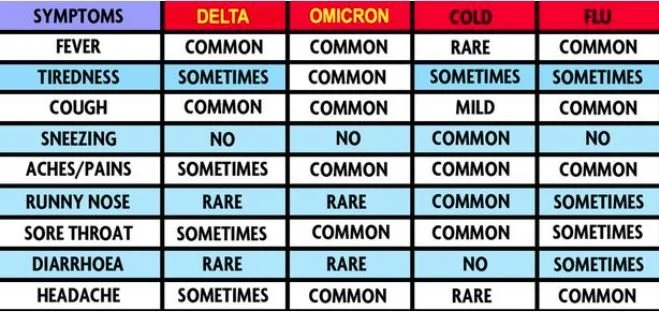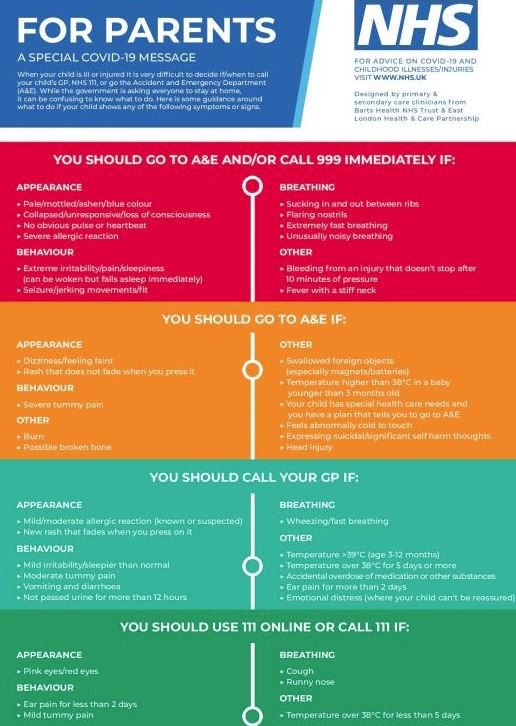
Coronavirus
Below is a range of resources setting out our response to the coronavirus pandemic, including focus on the omicron variant and potential future plans.
* UPDATE SUMMER TERM 2022 *
It is not recommended that children and young people are tested for COVID-19 unless directed to by a health professional.
If a child or young person has a positive COVID-19 test result they should try to stay at home and avoid contact with other people for 3 days after the day they took the test, if they can. After 3 days, if they feel well and do not have a high temperature, the risk of passing the infection on to others is much lower. This is because children and young people tend to be infectious to other people for less time than adults.
Children and young people who usually go to school, college or childcare and who live with someone who has a positive COVID-19 test result should continue to attend as normal.
February 2022 - please click here for the letter sent out to parents regarding updated Covid-19 isolation guidance.
January 2022 - latest guidance on self-isolation and testing requirements is set out in the two tables below.
Coronavirus and the Omicron Variant
On 26 November 2021, WHO designated the variant B.1.1.529 a variant of concern, named Omicron. Here is a summary of what is currently known.
Current knowledge about Omicron
Some projections of future infection rates in the UK are concerning. The UK Health Security Agency (UKHSA) believes the Omicron variant is causing around 200,000 new infections per day in mid-December 2021. It is right that school prepares to manage future outbreaks and keep our children and staff safe. Researchers in South Africa and around the world are conducting studies to better understand many aspects of Omicron.
Transmissibility: It is not yet clear whether Omicron is more transmissible compared to other variants, including Delta although early evidence suggests strongly that it is. The number of people testing positive has risen in areas of South Africa affected by this variant, but epidemiologic studies are underway to understand if it is because of Omicron or other factors. On the 16th of December there was a 29% increase in positive cases in the UK.
Severity of disease: It is not yet clear whether infection with Omicron causes more severe disease compared to infections with other variants, including Delta. Preliminary data suggests that there are increasing rates of hospitalization in South Africa, but this may be due to increasing overall numbers of people becoming infected, rather than a result of specific infection with Omicron.
Early reports from the South African Medical Association show Omicron may have five distinct symptoms of its own:
A scratchy throat (as opposed to a sore throat)
A dry cough
Extreme tiredness
Mild muscle aches
Night sweats
The WHO states that there is currently no information to suggest that symptoms associated with Omicron are significantly different from those from other variants. Initial reported infections were among university students—younger individuals who tend to have more mild disease—but understanding the level of severity of the Omicron variant will take days to several weeks.
Re-infection
There may be an increased risk of reinfection with Omicron (ie, people who have previously had COVID-19 could become reinfected more easily with Omicron). Vaccines remain critical to reducing severe disease and death, including against the dominant circulating variant, Delta. Current vaccines remain effective against severe disease and death.
Effectiveness of current tests: The widely used PCR tests continue to detect infection, including infection with Omicron, as we have seen with other variants as well. Studies are ongoing to determine whether there is any impact on other types of tests, including rapid antigen detection tests.
December 2021 Onwards
In anticipation of an expected upsurge in cases of the omicron variant, the government has introduced its ‘Plan B’ measures which include accelerating the booster programme; working from home and increased mask-wearing. The government updated its Operational Guidance for schools which is available here:
The latest Department for Education guidance for parents and carers is available here
early reports of common symptoms
The guidance makes clear that schools must do everything possible to remain open and must not move teaching online if it can be avoided. However, the Health Secretary has confirmed that ‘there are no guarantees’ that additional preventative measures will not be necessary in 2022.
With this in mind, we have sent out letters to parents (available here and to the right) and made sure that office staff follow national guidelines and work from home whenever possible. School will continue to be well-ventilated and high standards of hand and respiratory hygiene will continue to be promoted. Late-term school events have been postponed (the talent show; end of term service) or adjusted to be safe (Christmas Fayre to become child-only).
Our Covid policy and Risk Assessment have been updated and are also available to the right.
Here is a lovely book which explains the Coronavirus in a child-friendly manner. The illustrations are by Axel Scheffler which can only be a good thing!
Here are three booklets which offer advice to help you talk to your child about Covid-19. For younger children; for children aged 8 - 14 years and for teenagers.
Finally, here is advice from the Educational Psychology service about how to talk to children about Covid-19.
Recommended actions for people
In general, the most effective steps individuals can take to reduce the spread of the COVID-19 virus is to keep a physical distance of at least 1 metre from others; wear a well-fitting mask; open windows to improve ventilation; avoid poorly ventilated or crowded spaces; keep hands clean; cough or sneeze into a bent elbow or tissue; and get vaccinated when it’s their turn.
How to help to slow the spread of Coronavirus
The Government, and the NHS, have issued the following advice to enable us all to prevent spreading any respiratory virus:
Wash your hands often – with soap and water for at least 20 seconds, or an alcohol-based sanitiser if soap and water aren’t available.
Avoid touching your eyes, nose, and mouth with unwashed hands.
Avoid close contact with people who are sick.
If you feel unwell, stay at home and don’t attend work or school.
Cover your cough or sneeze with a tissue, then throw the tissue in a bin.
Clean and disinfect frequently touched objects and surfaces in the home.
If you have a high temperature, a cough, or shortness of breath, please call NHS 111 – don’t go directly to your GP or other healthcare environment.
Remote Learning Preparation, 2022
First, we all hope desperately that the following will not be necessary. However, school must be prepared for the possibility of a school closure.
Our Remote Learning Policy is available here and to the right. Here is an information poster about Zoom and here are some tips to support your child with their online learning.
We understand the risk to children’s mental health which lengthy school closures can cause. We hope this Well-being booklet might be of help.
Covid-19 Policy
Covid RA
Remote Education Offer
Letter to Parents 13.12.21
School Guidance Dec 2021
Letter from DCC 14th Dec 2021
Educational Psychology advice
A Book for children
Wellbeing Booklet
Covid information for younger children
Covid information for 8 - 14 year olds

Designated Safeguarding Lead
Mr J Green
Designated Safeguarding Lead: 1st cover
Monday, Tuesday: Mrs D Wallen; Wednesday - Friday: Mrs E Dennis
Designated Link Governor for Safeguarding
Mrs C Stroud
















